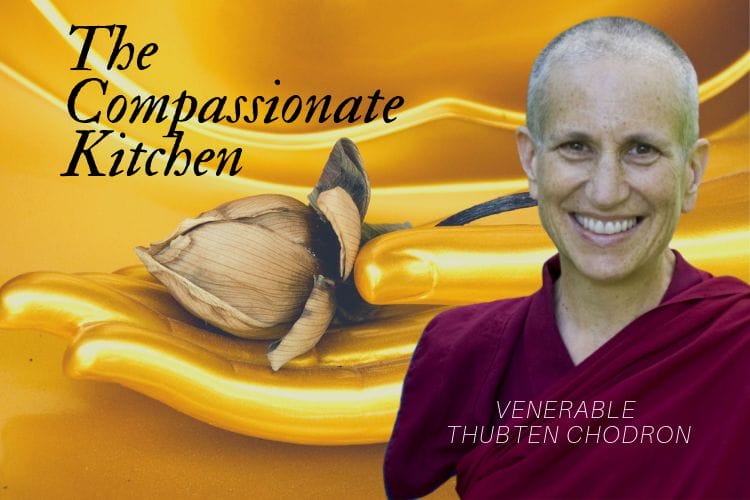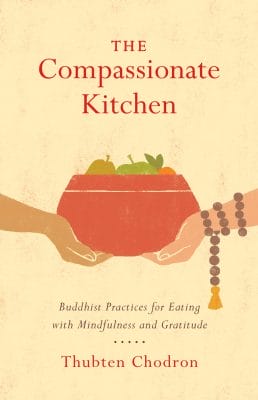Thubten Chodron: The Compassionate Kitchen

Venerable Thubten Chodron is an American Tibetan Buddhist nun, author, teacher, and the founder and abbess of Sravasti Abbey, the only Tibetan Buddhist training monastery for Western nuns and monks in the United States. Venerable Chodron emphasizes the practical application of Buddha’s teachings in our daily lives. Her latest book is The Compassionate Kitchen.
Venerable Thubten Chodron: The Compassionate Kitchen and the Economy of Generosity
Interview by Sandie Sedgbeer
To listen to the entire interview of the Venerable Thubten Chodron by Sandie Sedgbeer from her OMTimes Radio show, What Is Going OM, click the player below.
Food is undoubtedly one of the greatest pleasures in life. We all spend a good time thinking about it, preparing it, eating it, and then cleaning up afterward, but how many of us have ever thought about the many activities associated with food as a spiritual practice?

What if instead of seeing these activities as chores or engaging in them purely for pleasure, we could use them to increase our kindness and care and as reminders of how we wish to live out the values that bring meaning to our lives?
The Venerable Thubten Chodron has been a Buddhist nun since 1977. She has been a close student of the Dalai Lama with whom she’s co-authored several books. She is also founder and abbess of Sravasti Abbey. One of the first Tibetan Buddhist training monasteries for Western monks and nuns in America.
Known for her warm, practical, and humorous explanations of how to apply Buddhist teachings in daily life, Venerable Chodron joins us today to talk about her latest book, The Compassionate Kitchen, in which she shares some of the practices from the Buddhist tradition that help us make eating become part of our daily spiritual practice. Venerable Thubten Chodron, welcome to What is Going OM.
Sandie Sedgbeer: Now, you were born in Chicago, and you grew up near Los Angeles. You graduated with a B.A. in history from the University of California, and after traveling through Europe, North Africa, and Asia for 18 months, you received a teaching credential, after which the University of Southern California to do post-graduate work in education.
You also worked as an elementary teacher at the same time in the Los Angeles city school system, and then in 1975, you attended a meditation course, after which you went to Nepal to study and practice the Buddhist teachings. What did you find in Buddhism that took you away from your Los Angeles teaching career to become an ordained Buddhist nun?
Venerable Thubten Chodron: Well, I was looking very much for meaning in my life, some long-term meaning, and I was asking a lot of questions about this. I thought meaning had something to do with helping other people, so that’s why I went into education, but then when I went to a meditation course in the certification and encountered Buddhism, it really made sense to me.
The teachers encouraged us to think about what they said, to test it out with logic and reasoning and see if it made sense and also to test it through, the meditation practice and seeing if that helped us.
So, I did both of that. Looking at it through reasoning and also doing the practice, I found it really made sense, and it helped me quite a bit. So, I wanted to learn more. I had a very strong feeling that if I didn’t learn more about Buddhism that at the end of my life, I would have a deep regret.
So, I quit my job, and I went to Nepal and India, where these teachers were because it was very difficult to encounter Buddhist teachings in English in the US at that time. So, I went back to Asia and spent time in the Tibetan community.
Sandie Sedgbeer: Had you had any religious upbringing, particularly?
Venerable Thubten Chodron: Yeah, my family was Jewish. It wasn’t very religious; I had a spiritual upbringing. But it didn’t really make sense to me. So, I realized a lot of the ideas about a Creator God, they make sense to other people. They help other people, but it just didn’t resonate with me.
However, I am very appreciative to my Jewish upbringing for teaching me good, ethical conduct and also the concept in Judaism of Tikkun Olam, to repair the world, to heal the world, and so, that already had in me the ideas of love and compassion and service. When I encountered Buddhism, it just really took off and showed me how to develop those qualities in a very practical way.
Sandie Sedgbeer: When you left America for Nepal, did you have any idea at that point that you may one day become Buddhist nun, or were you just following your heart and seeing where it led?
Venerable Thubten Chodron: Actually, after encountering Buddhist teachings, I knew rather quickly that I wanted to ordain, which is very surprising, and now, when I meet people who have a bad experience, I’m a little bit skeptical, well, why so soon do you want to ordain?
But with me, it’s like I knew; I went to Asia. And after living there for a while in the monastery, then I requested my teacher for ordination.
Sandie Sedgbeer: You studied and trained all over the world. Practicing Buddhism in India and Nepal under the guidance of his holiness, the Dalai Lama, and other Tibetan masters. You directed a spiritual program in Italy for two years, studied at the monastery in France.
Was a resident teacher at a Buddhist center in Singapore, and you spent 10 years as a resident teacher at Dharma Friendship Foundation in Seattle. You’re on the of the first generation of bhikkhunis who brought the Bodhadharma back to the USA. Tell me first, what is the Boddhadharma?
Venerable Thubten Chodron: The Buddhadharma refers to the Buddhist teachings, yeah, the Buddhist doctrine. That’s the meaning of the word.
Sandie Sedgbeer: You then went home to establish, the first Tibetan Buddhist training monasteries for Western monks and nuns in America. What inspired that decision? Did you just wake up one morning and think, I’ll start a monastery, or was it a long thought-out process?
Venerable Thubten Chodron: Well, when I first went to Nepal, I was living at a monastery, I liked very much living in the community. Of course, it has its challenges, but the Buddha set it up so that we lived together, a live-in community, because that way you have a lot of support from your environment and from the people around you. Being one of the first generations of Tibetan monks and nuns, Westerners, in tradition, we didn’t have any monasteries. There were Dharma centers, but the Dharma centers were geared towards the lay people and not towards the monastic way of life. So, I always had this feeling, I just want to live in a monastic environment so that we can really practice according to our precepts. I lived alone, and–but all the time in my heart, I really wanted to start a community, we need this for the Buddhadharma to spread and prosper in the West. So, that was kind of the inspiration to start a monastery.
If people had told me when I was 20 that I would be a nun and that I would start a monastery, I would’ve told them they were out of their mind, but our life often turns out to be very different than we had initially thought.
Sandie Sedgbeer: Absolutely. So, what were the challenges that you had to face? How were you going to support it?
Venerable Thubten Chodron: That was exactly what I went through because there was no big organization behind me. It was relatively easy to support me, but starting a monastery, entailed a property. So, there was some money that I had saved up from offerings that I had received. When we found a property, which was gorgeous; the owner offered to carry the mortgage for us, then I used that bit of savings and then just put out the word to other people, that this is what we’re doing.
Continue to Page 2 of the Interview with Venerable Thubten Chodron – The Compassionate Kitchen
A veteran broadcaster, author, and media consultant, Sandie Sedgbeer brings her incisive interviewing style to a brand new series of radio programs, What Is Going OM on OMTimes Radio, showcasing the world’s leading thinkers, scientists, authors, educators and parenting experts whose ideas are at the cutting edge. A professional journalist who cut her teeth in the ultra-competitive world of British newspapers and magazines, Sandie has interviewed a wide range of personalities from authors, scientists, celebrities, spiritual teachers, and politicians.




